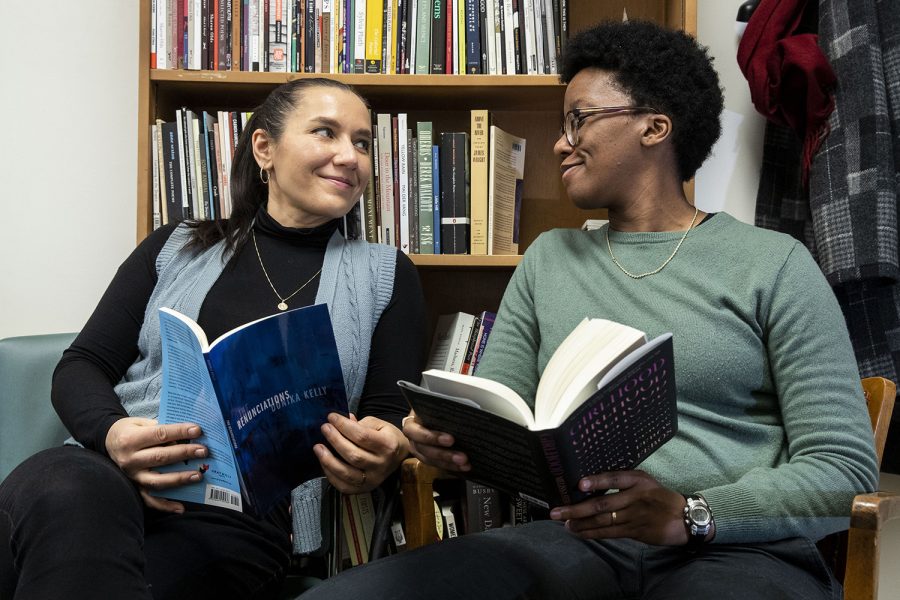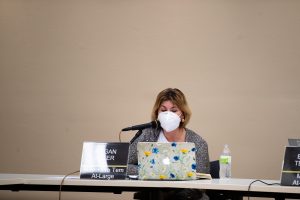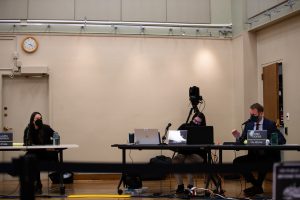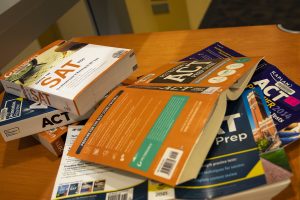Two UI professors recognized as finalists for national book award
University of Iowa Professors Donika Kelly and Melissa Febos are finalists for the National Book Critics Circle Awards for their books, “The Renunciations: Poems” and “Girlhood.”
Authors Melissa Febos and Donika Kelly pose for a portrait holding each other’s books in the English Philosophy Building at the University of Iowa on Thursday, Jan. 27, 2022. Both Kelly and Febos have been named finalists in the 2022 National Book Critics Awards for the books. Febos’ book, “Girlhood,” explores the narrative women are taught on what it means to be female. “The Renunciations,” by Kelly, is a series of poems about the journey of one’s self during trauma. The awards will be presented virtually in March. (Grace Smith/The Daily Iowan)
February 1, 2022
Writers and partners Donika Kelly and Melissa Febos are finalists for the 2021 National Book Critics Circle Awards.
Kelly and Febos, University of Iowa assistant and associate professors of English, are nominated for their books The Renunciations: Poems and Girlhood, respectively, under the Poetry and Criticism categories. The awards will be presented on March 17 in a virtual ceremony, free and open to the public.
Since 1974, the National Book Critics Circle has presented awards recognizing the best books published in six categories: fiction, nonfiction, biography, autobiography, poetry, and criticism.
Kelly and Febos will compete against five other authors in their respective categories.
The National Book Critics Circle is made up of 800 members consisting of critics, authors, literary bloggers, book publishing professionals, and more. Finalists and awards are chosen by the organization’s members, according to its website.
Febos said it is an honor to be recognized as a finalist for the award alongside Kelly.
“The idea that both of us would be finalists in the same year just seems so far-fetched. We just stood in the hallway and sort of laughed when we found out, and then did a little dance,” she said. “I feel so lucky to be able to write for a living and talk about writing with my students for a living.”
Febos said the process of writing Girlhood started back in 2017, as she went back through childhood journals for research on an essay. She discovered that a younger version of herself had rewritten experiences differently from how she remembers them now.
The experience prompted Febos to interview other women with similar experiences to see how their growth as a woman had played out later in life through systemic values.
“These were sort of really fraught experiences of bullying in particular that I sort of rewrote the narrative in a way that would be more digestible to me psychologically,” she said. “I became curious about unearthing other narratives that I had rewritten in order to make them less burdensome of which might be worth a reexploration.”
Kelly said engaging with her students has been instrumental in how she approaches her work and it has helped her develop a language for thinking about poetry differently.
“Teaching absolutely feeds my work. In the poetry workshops I teach, we read a lot, and the conversations that come out of those readings are just so fun and so helpful,” she said. “The students here are so great at reading and being open to the experience of a poem.”
Kelly said she started working on her poetry collection during her time living near Buffalo, New York. She said she had recently moved to the area, and didn’t have much pulling her attention elsewhere, so she began writing.
“I was making a lot of observations, feeling a lot of feelings, and the place where all of that went was in two poems,” Kelly said.
The poems in The Renunciations tell the story of how someone’s perspective of themself can be altered after experiencing trauma, with Kelly touching on themes of love, resilience, and survival.
Even though she does not necessarily write her poems for other people, Kelly said it’s exciting to share her work with readers who recognize it as art.
“Poems are a space for me to process what I’m thinking and how I’m thinking to investigate how I came to the stories that have defined so much of my life,” she said. “It feels like an investigatory practice that’s been really vital for both my life as a writer and a teacher.”
Loren Glass, UI English department executive officer and professor, said writers like Febos and Kelly as writers and professors demonstrate the direction in which the department is heading.
“It shows that we are the English department of the future,” he said. “We’re going to have folks who are both critics and content producers, folks exactly like Melissa and Donika who have really combined being an artist and a critic in a way that we haven’t seen as much in the English department.”
Febos said if there is ever a time that she thinks about the audience who would enjoy her work, she thinks of one reader specifically and said she feels grateful that so many have related to Girlhood.
“If I’m ever thinking of any kind of reader in particular it is of a slightly younger version of myself, or whatever kind of reader that has shared my experience and needs some company in that process,” she said. “This book, that has touched so many people, has been incredibly rewarding.”






